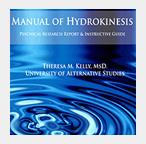Hydrokinesis
Parapsychology Articles, Papers and Books
Home > Articles > Psychic Phenomena > Psychokinesis > Hydrokinesis
![]()
|
| NEWSLETTERS |
| Get the best from QPsychics.com in your inbox! |
|
| PARAPSYCHOLOGY ORGANIZATIONS |
"With confidence in the importance of utilizing the investigative mode of the established sciences in order to inquire into the authenticity and to potentially explain the nature of psychical phenomena."  |
 |
 |
 |
 |
Perspiration, Thermoregulation, and Water Retention
Hydrokinesis is defined as the psychokinetic ability to influence the flow of liquids via either mental influence or an experients own natural electric or electromagnetic fields, primarily in the hands. For these individuals, the most common side effect experienced during the unstable performance of hydrokinetic phenomena is in regards to water and the body. Water based abnormalities can present themselves in a variety of ways including excessive perspiration. Experients may notice excessive sweating during physical activity, or simply during mild daily activities. The abnormal perspiration is commonly coincided with unpleasant odors not only on the body, but also on clothing. This phenomenon is theorized to be a built-in mechanism to prevent difficulties with thermoregulation in experients of unstable hydrokinetic phenomena. Instability can result in electrical buildup causing intense heat in several regions of the body. Excessive perspiration is the method the body then uses to cool itself down. Needless to say, this side effect is only prominent in experients in which utilize electric or electromagnetic fields to induce or influence liquid flow. Another side effect pertaining to hydrokinetic instability is water retention. Water retention is commonly reported as excessive weight gain, but is also indicative of a lack of thirst, or lacking of signs of dehydrations after not consuming adequate amounts of water over an extended period. Because these effects are due to instability, these effects tend to subside after stability is obtained.
(Adapted from the paper "Manual of Hydrokinesis: Applications, Experimentation, and Measurement” by Theresa M. Kelly, MsD.)
| |||
Related Articles |
|||

